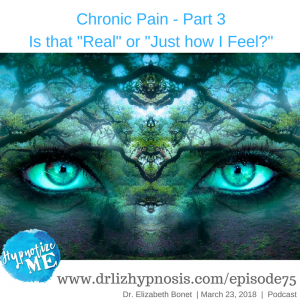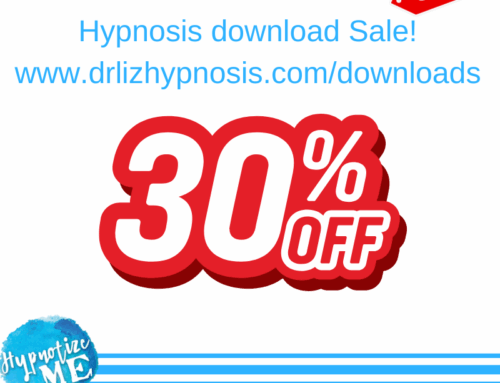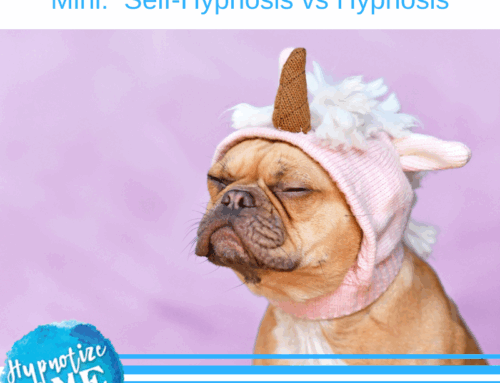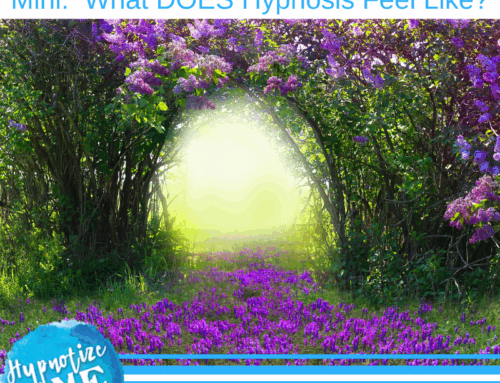Pain Reduction with Hypnosis – Is it Real?
Today let’s look at a study that evaluates whether pain reduction using hypnosis is a “real” experience. I get the question all the time . . . . “Is stuff going on in the pain centers of the brain or is it just my imagination?”
I did a podcast episode on this as well – Chronic Pain – Part 3 – Is that “Real” or “Just how I Feel?” that talks about three different studies that use physiological measures of pain to see what’s happening in the body during hypnosis.
But today I want to look at this study: “The Neurophysiology of Pain Perception and Hypnotic Analgesia: Implications for Clinical Practice” by Mark P. Jensen Ph.D., American Journal of Clinical Hypnosis, 51:2, 123-148, https://doi.org/10.1080/00029157.2008.10401654
This study makes clear that there is no “pain center” in the brain. The brain is not simply a passive recipient of messages from the outside or inside of the body. Instead, multiple systems and integrated networks work together to create the global experience of what we call “pain.” There are about 15 systems involved in creating this experience. That’s a lot! Some of the major systems that are involved are:
- Spinal Mechanisms
- Supraspinal (Above the Spine) Mechanisms
- Thalamus
- Somatosensory cortex
- Anterior cingulate cortex
- Insula (part of the neocortex)
- Prefrontal cortex
There are receptors that trigger information which are called nociceptors. Nociceptors can be more or less sensitized, are exceedingly complex, and can change as a function of the factors above.
What this means is that how someone experiences pain and how someone DECREASES the experience of pain is very individual. When they put people under brain scans though, they do know that with hypnosis . . .
“Similar brain areas became active following both noxious stimulation and hypnotic suggestions for pain, including the thalamus, ACC, midanterior insula, and parietal and prefrontal cortex. This research is striking in that it shows that hypnotic suggestions without physical stimulation can create reports of sensations (in this case, pain), and that the brain responds as if the sensations were real (see also Kosslyn, Thompson, Costantini-Ferrando, Alpert, & Spiegel, 2000, for similar findings concerning the perception of color).”
If people can create the sensations of pain with hypnosis, they can also create more comfortable sensations! When they looked at this, the authors found that even just creating a “safe place” with imagery led to decrease in someone’s experience of pain for hours after working with the hypnotherapist.
What that means is that you can learn this skill and then apply it at home as well to decrease your own perception of pain with something as simple as imagining a “safe place.” Having said that, what the authors recommend for longer-term pain relief is
“’hypnotic analgesia’ is not a single treatment that affects pain via a single underlying physiological mechanism. Instead, different hypnotic suggestions appear to affect pain experience via their effects on different neurophysiological processes and sites.”
To translate, what type of work we do with hypnosis depends on how and where you’re experiencing pain. Whether and how you experience pain as global (all over) or local (just in one area) is also important. They go into quite a lot of depth in the article about the different techniques to use depending on how the patient is experiencing pain and what systems those techniques affect. I find brain studies so amazing in their ability to give us the information we need to do better treatment.
Who wants to be addicted to pain medication?
I don’t truly believe anyone does. I think people find themselves addicted by accident, due to an accident or a chronic condition that causes pain. And they don’t know what to do other than try to manage the pain with medication. When they try to wean off of it even, their bodies (and brains!) freak out and they don’t have any other mechanisms to help themselves with.
This is where hypnosis comes in and brain studies about hypnosis. The effect is real. The brain actually sees and feels hypnosis as a pain reducer. And then it reacts as it would to pain medication, by reducing someone’s experience of pain.
 I specialize in hypnosis for anxiety and chronic conditions. Although my office is in Broward county and the Fort Lauderdale / South Florida area, I work with people all over the world. To see if we’re a good fit to work together, schedule your free consultation at 954-309-9071.
I specialize in hypnosis for anxiety and chronic conditions. Although my office is in Broward county and the Fort Lauderdale / South Florida area, I work with people all over the world. To see if we’re a good fit to work together, schedule your free consultation at 954-309-9071.
Click to Schedule a Free Consultation
Yours in health,
Dr. Liz








